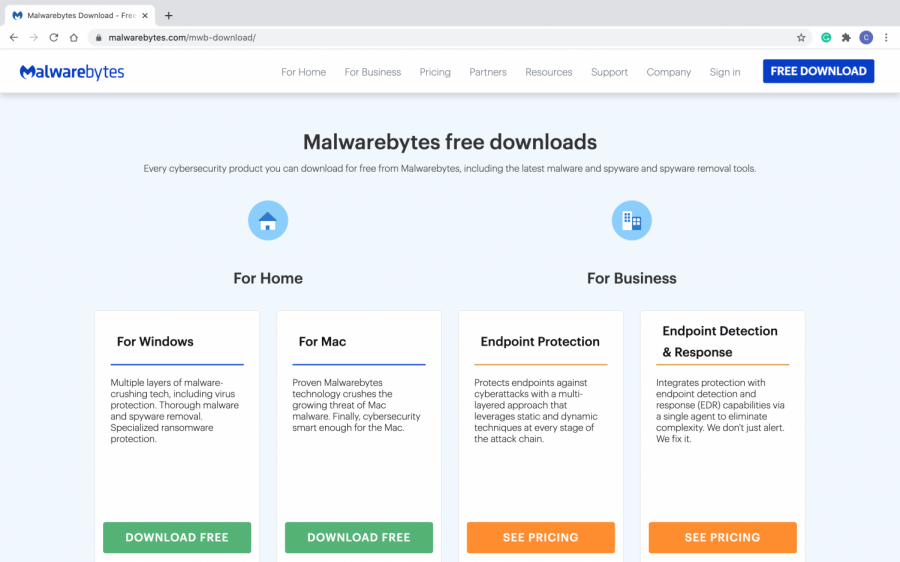Prevent despair and download antivirus software
Malwarebytes is one of the many free anti-virus software that you can download to block harmful viruses and threats to your computer.
February 15, 2021
Virtually everyone in the world has some sort of internet access. Within the last decade, online shopping has skyrocketed. Most online shoppers use credit or debit cards for purchases and save the card information on the online stores. If you work remotely, your job-related data may be extremely important. Your employer will likely be displeased if you install a computer virus that steals your company’s data. Here are some tips to ward off viruses and protect your computer or mobile device.
1. Identification and avoidance
Computer viruses cannot infect your data without some form of human interaction, meaning if you can avoid them, you won’t get them. Don’t click a link or download a file attached to an email from an unknown sender. The link may look legitimate, but it may download a virus onto your device. Don’t click on any ad that has a large, fake button with the word “download.” This is only of importance with certain websites that are used to download computer programs or related services. These sites will have a legitimate download button but make sure the button you see is the real button and not an ad. Some dead giveaways are an “X” in one of the corners to close the ad or a fine print label beneath it saying “advertisement.”
Additionally, many programs have multiple download buttons for different computer operating systems and requirements. These specifications typically are around or are on the download button. Viruses should not be your only concern about websites. Some scams disguise themselves as popular websites; these are often online stores or social media. Logging in to a fake site gives the creator your username and password for the real site. Online shoppers should be extra wary, as your login may hold your credit card information, other purchase methods, or even your address.
2. Malware protection programs
If you attempt to go to a potentially harmful website and don’t realize it, antivirus software will likely prevent the page from loading. There are many notably reliable programs downloadable for free with similar benefits to premium ones. I, personally, use the free versions of Malwarebytes and Kaspersky. Two programs aren’t necessary, but it adds a slightly higher amount of protection than just one.
3. Computer “checkups”
Regularly (as often as you want, but the more, the better) use your malware protection software to scan your computer files for any programs or files that might be potentially harmful. Malewarebytes offers this and will isolate any suspicious files because some modern computer viruses can behave just like real viruses. They can infect different storage locations in your computer if given the chance. Malwarebytes Premium, which is $3.33 monthly, or $5 if you get the family deal for multiple devices, allows you to schedule automatic scans if that is of interest. If your software cannot run a diagnostic scan, you should supplement it with software that can. Most viruses don’t appear as a folder in your storage. Instead, they attach themselves to the folder or code for a legitimate program such as “Microsoft Word.” These viruses are next to impossible to spot just by looking through your storage.
4. “Curing” your device
If you believe you have an infected computer, the first step is to install and run antivirus software as soon as possible. There are numerous programs with different instructions available, so if your virus persists, find a new antivirus. If none of these options work, you have three more options that should be avoided, if possible. The first is to accept the fact that your computer is infected. This is strongly ill-advised if you have ever signed into a webpage or an app where data may be physically stored on your computer and is within the virus’s reach. The second option is to hard reset your computer or mobile device, which should be an option within its settings. This will erase all of your data, including almost all types of viruses. The third option is for the 1 percent, which is known as Memory-Resident Malware. This type of virus infects the operating system, not the computer files, and the only way to get rid of it is by buying a new device to use.
Computer viruses can be difficult to handle, but hopefully, these tips will help you mitigate and even fight their intrusions. Computer safety may not seem important until it’s too late, so go ahead and practice these steps.






